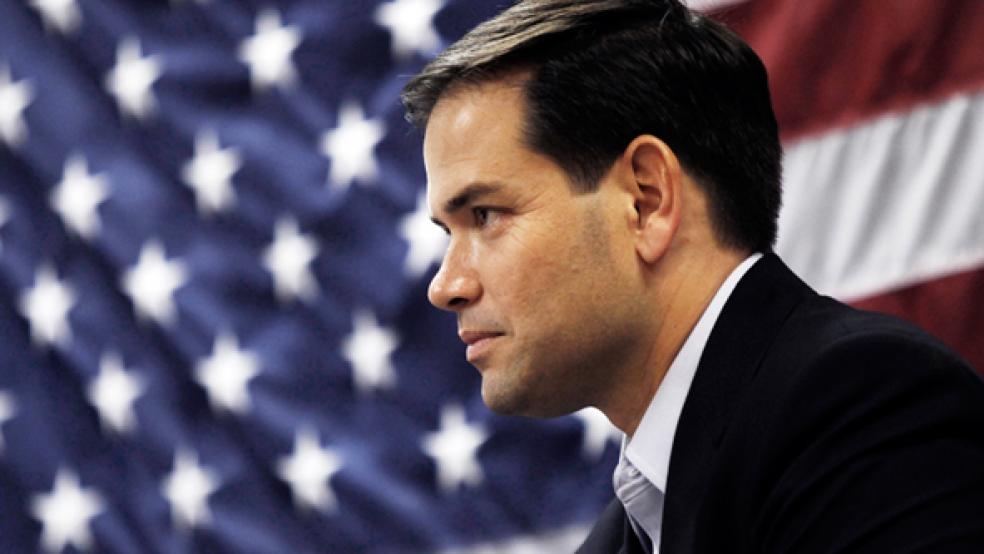Eight odd bedfellows emerged from the Senate’s early morning vote Monday on a major tax and spending compromise aimed at averting the worst impact of the fiscal cliff.
While 89 senators voted in favor of the measure, five Republicans and three Democrats voted against it, risking the possibility of sending the economy back into recession. They viewed the deal as highly flawed, although they came to their conclusions from opposite points of view.
The new “gang” of Republicans includes Marco Rubio of Florida, a potential presidential candidate in 2016; Rand Paul of Kentucky, a Tea Party favorite and ardent advocate of smaller government; and Charles E. Grassley of Iowa, a former Finance Committee Chairman who helped push through the Bush era tax cuts that would be extended under the deal to all but the wealthiest Americans. Mike Lee of Utah and Richard Shelby of Alabama fill out the GOP roster.

The three Democrats include Tom Harkin of Iowa, chairman of the Health, Education, Labor and Pensions Committee; Michael Bennet of Colorado and Thomas R. Carper of Delaware. Bennet was recently tapped as chairman of the Democratic Senatorial Campaign Committee for the 2014 election cycle. He created his own plan to avert the fiscal cliff in November alongside Republican senator Lamar Alexander.
Here’s what these eight Republican and Democratic outliers had to say about the fiscal cliff compromise:
DEMOCRATS:
Michael Bennet of Colorado: "Washington once again has lived up to its reputation as the ‘Land of Flickering Lights.’ For four years in my town hall meetings across the state Coloradans have told me they want a plan that materially reduces the deficit. This proposal does not meet that standard and does not put in place a real process to reduce the debt down the road."
Tom Carper of Delaware: Carper champions the recommendations of the presidential Bowles-Simpson fiscal commission and objects to a more piecemeal approach to spending and tax reforms. “The Bowles-Simpson proposal is a smart plan that puts everything on the table, not just spending cuts. Importantly, Bowles-Simpson would also raise revenue through comprehensive tax reform that eliminates loopholes and lowers tax rates for families and small businesses.”
Tom Harkin of Iowa: “Every dollar that wealthy taxpayers do not pay under this deal, we will eventually ask Americans of modest means to forgo in Social Security, Medicare and Medicaid benefits. It is shortsighted to look at these issues in isolation from one another, especially when Congressional Republicans have been crystal clear that they intend to seek spending cuts to programs like Social Security just two months from now, using the debt limit as leverage."
REPUBLICANS
Charles Grassley of Iowa: "It'd be one thing to raise taxes to reduce the deficit, but that's not what this deal does. It's a fiscal farce to raise taxes and hurt economic growth only to fuel more government spending with record deficits and debt. People at the grass roots want Washington to spend less, not more. Failure to deal with spending lets them down."
Mike Lee of Utah: Lee tweeted on Monday: that “even the best #fiscalcliff deal will leave 99 percent of a dysfunctional system intact”
Rand Paul of Kentucky argues that the deal was just "kicking the can down the road, and we aren't really addressing the real crisis in our country. . . . It's impossible to get to any deal on the fiscal cliff when Majority Leader Reid and President Obama refuse to consider meaningful cuts in spending. They are demanding we raise taxes on working families and small businesses -- and worse -- using these tax increases for more government spending. . . . Sending more taxpayer dollars to Washington isn't the solution to this situation; cutting wasteful government spending and enabling Americans to keep more of their own money is."
Marco Rubio of Florida: “I appreciate all the hard word that went into avoiding the so-called 'fiscal cliff.’ I especially commend Senator McConnell's efforts to make the best out of a bad situation. Nevertheless, I cannot support the arrangement they have arrived at. Rapid economic growth and spending reforms are the only way out of the real fiscal cliff our nation is facing. But rapid economic growth and job creation will be made more difficult under the deal reached here in Washington. Thousands of small businesses, not just the wealthy, will now be forced to decide how they'll pay this new tax and, chances are, they'll do it by firing employees, cutting back their hours and benefits, or postponing the new hire they were looking to make. And to make matters worse, it does nothing to bring our dangerous debt under control.”
Richard Shelby of Alabama: "I do not support this agreement. Our economy needs spending restraint by the federal government and fundamental tax reform that eliminates corporate welfare and lowers individuals' rates. Instead, this package raises taxes, increases spending, and will lead to more borrowing. This deal is certainly no cure-all; rather, it falls far short of the measures necessary to promote job creation, economic growth, and fiscal stability."





